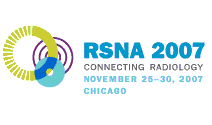
Abstract Archives of the RSNA, 2007
LL-NR4060-L04
Continuously Monitoring of the Brain during Severe Insulin-induced Hypoglycemia by Diffusion-weighted MR Imaging
Scientific Posters
Presented on November 28, 2007
Presented as part of LL-NR-L: Neuroradiology/Head and Neck
Peter Schmidt MD, Abstract Co-Author: Nothing to Disclose
Joachim Boettcher MD, Abstract Co-Author: Nothing to Disclose
Alexander Saemann MD, Abstract Co-Author: Nothing to Disclose
Hans Joachim Mentzel MD, Abstract Co-Author: Nothing to Disclose
Werner Alois Kaiser MD, PhD, Abstract Co-Author: Researcher, Siemens AG
Researcher, Bayer AG (Berlex Inc)
Researcher, General Electric Company (Amersham plc)
Researcher, Suros Surgical Systems, Inc
Researcher, C. R. Bard, Inc
Researcher, Boston Scientific Corporation
Researcher, Galil
Researcher, Invivo
Researcher, Confirma
Researcher, CAD Sciences
Researcher, Carl-Zeiss
Alexander Pfeil MD, Presenter: Nothing to Disclose
Severe cerebral hypoglycemia,with onset of neurological symptoms, frequently seen in individuals with diabetes, is reported to be associated with reversible diffusion disturbance which could be visualized as hyperintense lesions by diffusion weightened brain imaging particular in the splenium and corona. This study is focused on the evaluation of hypoglycemic pathogensis, especially with regrad to the severity of insulin-induced reversible hypoclycemia.
10 individuals received an i.v. bolus insulin of 0.15 U per kg body weight short acting insulin inducing hypoglycemia, while the individuals were continuously evaluated by a 1.5 T scanner (Siemens Sonata). Sequential diffusion-weightened echo planar sequences ( 4500/107 TR/TE) were obtained without interruption while blood glucose levels were estimated contemporarily. Examination was stopped as soon as serum glucose level was diminished to ≤ 2.0 mmol/l or subject wished to abandon the trial. Images were independently analyzed by two radiologist.
Subjects blood glucose levels were lowered to a mean of 1.75 ± 0.38 mmol/l, ranging from 1.3 to 2.4 mmol/l. All subjects developed a severe hypoglycemia of ≤ 2.5 mmol/l for 20.5 ± 10.7 minutes and 8 subjects a hypoglycemia of ≤ 2.0 mmol /l for 10 ± 5.3 minutes. Analyzing the MRI diffusion images, no alterations of cerebral diffusion could be observed in all individuals.
Short-time severe hypoglycemia (≤10 min) does not induce visible changes in MRI diffusion imaging, suggesting long-time hypoglycemia maybe the relevant cause for observed reversible diffusion disturbance in MR imaging.
Short term severe hypoglycemia does not result in visible changes of the human brain which is of clinical importance for patients suffering from diabetes.
Schmidt, P,
Boettcher, J,
Saemann, A,
Mentzel, H,
Kaiser, W,
Pfeil, A,
Continuously Monitoring of the Brain during Severe Insulin-induced Hypoglycemia by Diffusion-weighted MR Imaging. Radiological Society of North America 2007 Scientific Assembly and Annual Meeting, November 25 - November 30, 2007 ,Chicago IL.
http://archive.rsna.org/2007/5010400.html

